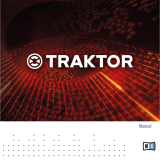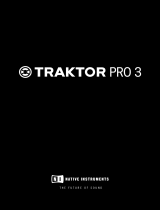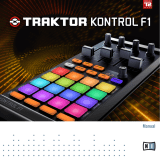Page is loading ...

Manual

The information in this document is subject to change without notice and does not repre
sent
a commitment on the part of Native Instruments GmbH. The software described by
this document is subject to a License Agreement and may not be copied to other media.
No part of this publication may be copied, reproduced or otherwise transmitted or record
ed, for any purpose, without prior written permission by Native Instruments GmbH, herein
after referred to as Native Instruments. All product and company names are ™ or ® trade
marks of their respective owners.
Document authored by: Ryan Rainer
Product Version: 1.0 (06/2010)
Document version: 1.0 (06/2010)
Special thanks to the Beta Test Team, who were invaluable not just in tracking down bugs,
but in making this a better product.
Disclaimer

Table of Contents
1 Introduction
5
2 The Effects
6
2.1 Common Parameters 7
2.2 TRAKTOR Delay 7
2.3 Digital LoFi 9
2.4 Mulholland Drive 9
2.5 Formant Filter 11
2.6 Peak Filter 11
2.7 Ring Modulator 12
2.8 TRAKTOR Reverb 13
2.9 Beat Masher 14
2.10 Gater 15
2.11 Reverse Grain 16
2.12 Transpose Stretch 17
2.13 Beat Slicer 19
2.14 TRAKTOR'S 12 Sampling Effects in Plugin Mode 20
3 Credits
21
Table of Contents
TRAKTOR'S 12 - Manual - 4

1 Introduction
Powered by the GUITAR RIG platform, a dozen of TRAKTOR’s tried and tested floor-rock
ing
effects have been adapted for use within your own productions. TRAKTOR has estab
lished itself as the DJ software of choice for the world’s top DJs—and one of the most
compelling reasons why, is the quality of its effects. TRAKTOR'S 12 includes some of the
most inspiring and contemporary sounds from TRAKTOR’s arsenal—effects that have been
road tested by top DJs in the world’s biggest clubs. Incredible delays, reverbs, and filters
join TRAKTOR’s unique and hugely popular Beatmasher, Transpose Stretch and Mulhol
land Drive, among others, to form a powerful studio tool with true club pedigree.
TRAKTOR'S 12 is the result of top DJs looking to move beyond the standard effects availa
ble
with most DAWs and bring the legendary power of TRAKTOR into their studio – without
needing complicated workarounds. Utilizing the GUITAR RIG PLAYER, TRAKTOR'S 12 is
instantly and easily usable in any studio set up. Maintaining the feel and ease-of-use fa
miliar from TRAKTOR, the FX are controlled by only four intuitive knobs and buttons—yet
retain an insane amount of sound mangling potential. Any Producer (DJ or otherwise) who
wants to bring the excitement and suspense TRAKTOR delivers in the club into their own
tracks will love the dirty dozen!
We sincerely hope you enjoy TRAKTOR'S 12.
Your Native Instruments team
Introduction
TRAKTOR'S 12 - Manual - 5

2 The Effects
This section describes each of the TRAKTOR'S 12 Effects and their associated controls in
detail.
After installation, TRAKTOR'S 12 is found under the Components tab in GUITAR
RIG. Double click or drag the effect you want to make it appear in the Rack.
Fig. 2.1 TRAKTOR'S 12 expanded in GUITAR RIG’s Component Window
The Effects
TRAKTOR'S 12 - Manual - 6

2.1 Common Parameters
All effects have the following sets of parameters in common:
▪ D/W (Dry/Wet): For all effects this parameter controls the mix between the original di
rect signal (Dry; full left position) and the processed effect signal (Wet; full right posi
tion).
▪ ON: For all effects this button turns the effect on and off. Some buffer based effects
such
as the Delay or the Reverb will continue outputting sound for a certain amount
of time, even after turning them off. To fully disable the action of an effect on a spe
cific channel use the Effect Assign buttons in the mixer strip of that channel.
2.2 TRAKTOR Delay
This is the classic tempo-synced filter Delay with Freeze button. When GUITAR RIG is
used
in Standalone mode, the rate of the Delay is directly controlled by the Master Clock
of GUITAR RIG to ensure that the Delay syncs to the beat even during tempo changes. You
can control the desired frequencies with the FILTER knob and control the strength of the de
lay’s
feedback with the FEEDBACK control. Change the delay time with the RATE knob or use
the FREE button to allow for continuous delay time changes.
Fig. 2.2 TRAKTOR Delay loaded in GUITAR RIG
The Effects
Common Parameters
TRAKTOR'S 12 - Manual - 7

Control Function
FILTER Internal high pass and low pass filter (similar to a bandpass filter). The
filter is open when the knob is in the centre position. It progressively
cuts out low frequencies when turned to the right and cuts out high fre
quencies when turned to the left.
FEEDBACK Controls the strength of the delay’s feedback, making the effect stronger
and more colorful. Min: low feedback. Max: strong feedback.
RATE Controls the Delay time. Min: long delay times. Max: short delay times.
The 7 available values are expressed in fractions of bars, and are equally
distributed over the range of the knob. Min - Max: 1/32, 1/16, 1/8,
3/16, 1/4, 3/8, 4/4.
MUTE Mutes the input signal.
SPRED (SPREAD) Creates an offset between the delay times of the left and right channel
giving the effect of spatial depth.
The Delay times are: L Min - Max: 1/32, 1/16, 1/8, 3/16, 2/4, 3/8, 4/4
R Min - Max: 1/32, 1/8, 3/16, 3/8, 3/8, 2/4, 4/4.
FREEZ (FREEZE) Freezes the Delay by closing the input and turning up the Feedback to
maximum value.
The filter remains active in the feedback loop.
For endless freezes, turn the FILTER knob down to the full left position.
FREE When pressed, delay times are not quantized and can be changed con
tinuously. Changing delay times while the Delay is active can result in
sudden skips in pitch and rhythm.
Even in FREEZ
mode the Delay follows the Master Clock and will therefore seamlessly merge
into the mix once released.
You can switch the effect rate during operation without any crackles or glitches in audio!
Note: The RATE
knob continues to work in FREEZ mode and allows interesting mash-ups. It is
important though to turn the knob down to low values only briefly because otherwise the buf
fer will empty.
The Effects
TRAKTOR Delay
TRAKTOR'S 12 - Manual - 8

2.3 Digital LoFi
Digital LoFi is a distortion effect that decomposes the music by reducing its bit depth and
the
sample rate. This effect adds digital artifacts and lets you to lower the "quality" of the
sound. Use this effect to change the Bit Depth of your input, or the Sample Rate reduction
to create a more "smooth" sound.
Fig. 2.3 Digital LoFi loaded in GUITAR RIG
Control Function
BIT (BIT DEPTH) Controls the bit rate ranging from full bit rate in full left position to just
above one bit in full right position.
SMOOTH Smoothes the effect by introducing a lag into the sample rate reduction.
SMPLRATE (SAMPLE RATE) Controls the Sample Rate reduction raging from no reduction in full left
position to 100 Hz sample rate in full right position.
Note: This knob only has an effect in combination with the Sample Rate
reduction.
SPRED Creates an offset between the sample reproduced on the right and left
stereo channel giving the effect of spatial depth.
2.4 Mulholland Drive
The Mulholland Drive is a highly sensitive overdrive effect with two independent overdrive
units and unpredictable self-oscillating behavior. Use the DRIVE knob to control which over
drive unit is fed more or to select a mixture between the two.
The Effects
Digital LoFi
TRAKTOR'S 12 - Manual - 9

Activate Feedback by turning the knob from the full left position. When Feedback is acti
vated,
it has greatest effect on music with gaps in it, such as drum loops, because the
self-oscillation can develop best in empty parts of the music.
Without Feedback activated Mulholland Drive behaves like a regular drive effect.
Fig. 2.4 Mulholland Drive loaded in GUITAR RIG
Control Function
TONE Controls the frequency of the feedback tone.
Requires a certain amount of feedback to have an effect.
Creates a great variety of tones when used in combination with the FEED
BACK
knob.
FEEDBACK Controls the amount of feedback in the effect ranging from 0 to 100%.
With zero feedback in full left position, the effect behaves like regular
tube distortion.
DRIVE (OVERDRIVE) Controls which of the two overdrive units is fed and by how much.
Drives only one unit in full left and full right position and morphs be
tween them when in between.
FBACK (INVERTED FEEDBACK) Only passes uneven harmonics, making the effect sound deeper in fre
quency.
GATE Acts as a noise gate to suppress sustained feedback.
At high DRIVE and FEEDBACK values the effect can produce sound even without any input.
The Effects
Mulholland Drive
TRAKTOR'S 12 - Manual - 10

2.5 Formant Filter
Formant Filter is a filter that imitates the sound of vowels spoken through the human
mouth
by morphing three bandpass filters into each other. Control the nature of this effect
by adjusting the “sharpness” of the vowel sound or the “size” of the mouth. Use the TALK
button to morph between the different vowel sounds and to adjust the brightness of the
sound.
Fig. 2.5 Formant Filter loaded in GUITAR RIG
Control Function
SHARP Makes the vowel sound more present by adding sharpness.
SIZE Represents the size of the mouth. On the left side, sound is comparable
to that of a child; on the right side it sounds more like an old man.
TALK Morphs between the formants that the mouth produces (a, e, i, o, u). On
the left it sounds dark becoming brighter when moving to the right.
TYPE
The
TYPE button deactivated makes the vowels sound “German.” Activat
ing the button makes them sound more “English.”
2.6 Peak Filter
The Peak Filter adds a peak to the original signal for a specific frequency spectrum, giving
you
DJ-friendly control over the frequencies you want to hear. The peak can be increased
to four times louder than the original signal. An additional brickwall limiter makes sure
that the increased db is limited to the maximum 0 db. Use the EDGE knob to add reso
nance and make the emphasized frequency more prominent.
The Effects
Formant Filter
TRAKTOR'S 12 - Manual - 11

Fig. 2.6 Peak Filter loaded in GUITAR RIG
Control Function
DRY/WET Not only mixes the modulated audio signal to the original signal but ad
ditionally increases the filter frequency of the peak.
PUMP Adds brickwall limitation to the effected signal. This effectively smooths
all the peaks and boosts the volume.
EDGE Modulates the width of the peak by increasing the resonance. When
turned to the right, the emphasized frequency becomes more and more
pronounced.
FREQ (FREQUENCY) Controls the frequency that is emphasized.
KILL Inverts the peak and gives the effect similar to a notch filter.
2.7 Ring Modulator
The Ring modulator is an effect that modulates the tracks by multiplying the high frequen
cy
signal onto the audio material. This effectively adds harmonics to the input. Choose be
tween amplitude or ring modulation and use the RAW knob to change the shape of the
modulator oscillator to create a “smoother” or a “harsher” effect.
The Effects
Ring Modulator
TRAKTOR'S 12 - Manual - 12

Fig. 2.7 Ring Modulator loaded in GUITAR RIG
Control Function
AM-RM Morphs the type of modulation from amplitude modulation in full left
position to ring modulation in full right position.
Amplitude modulation sounds softer compared to ring modulation.
RAW Controls the shape of the modulation oscillator.
The oscillator is a sine wave in full left position for smooth sounds and a
filtered square wave in full right position for harsher sounds.
PITCH Controls the frequency of the modulating oscillator from low in full left
position to high in full right position (100 Hz - 8371 Hz).
2.8 TRAKTOR Reverb
This is a Classic Reverb with extreme room sizes, individual low pass and high pass Filter
controls,
and Freeze function. Control the size of the room and the associated reverb
amount with the SIZE
knob and use the filters to achieve the desired frequencies in the ef
fect loop.
Fig. 2.8 TRAKTOR Reverb loaded in GUITAR RIG
The Effects
TRAKTOR Reverb
TRAKTOR'S 12 - Manual - 13

Control Function
HI PASS (HP) HP filter in the effect loop – fully open when turned to the right.
LOW PASS (LP) LP filter in the effect loop – fully open when turned to the left.
SIZE Controls the size of the added reverb, ranging from small to vast room
sizes.
MUTE Mutes the input signal.
FREEZ Freezes the Reverb by closing the input and leaving the output open.
2.9 Beat Masher
A buffer based effect for capturing a loop from the current audio material and successively
mashing
it up. Press the MASH
button to start the effect. A loop with a length defined by
the LENGTH
knob is sampled and played back. Use the GATE knob to produce a mixture of
sampled and currently played audio signal. Experiment with the REVRS, WRAP and ROTATE
controls to produce further interesting effects on the sound. When using GUITAR RIG in
Standalone mode, Beat Masher is synced to GUITAR RIG’s metronome.
Fig. 2.9 Beat Masher loaded in GUITAR RIG
The Effects
Beat Masher
TRAKTOR'S 12 - Manual - 14

Control Function
GATE Combined controller for different ways of mixing and gating the sam
pled material:
In full left position the effect is bypassed. From full left to center pro
gressively bigger chunks of the buffered audio are mixed in. In centre
position just the buffered audio is played. From center to full right posi
tion progressively bigger chunks of audio are cut out like a gater effect.
ROTATE Shifts the sampled audio relative to its original position in steps of 1/8
notes.
At minimum Length, the
ROTATE knob continuously rotates the sample.
LENGTH Controls the length of the audio played back from the buffer.
MASH Starts the effect. When this button is off there is no change in the sig
nal.
WRAP Re-syncs the effect to the start of each bar, no matter what the Length
value is.
REVRS (REVERSE) Reverses the playback direction of the buffered audio samples.
2.10 Gater
The Gater rhythmically mutes parts of the audio at adjustable rates. When using GUITAR
RIG
in Standalone mode, Gater is synced to GUITAR RIG’s metronome. The GUITAR RIG
Master Clock controls the rate and the point in time at which muting takes place. A hiss
ing noise can be added to the Gater using the NOISE knob for emphasizing the rhythmical
pattern.
Adjust the rate of the Gater by using the RATE knob or press the FREE
button to al
low for continuous rate changes.
In order for the Gater to match the beats in the music, it is absolutely necessary that your
tracks
have well aligned Beatgrids and that the Master Clock follows the track tempo in Auto
Mode.
The Effects
Gater
TRAKTOR'S 12 - Manual - 15

Fig. 2.10 Gater loaded in GUITAR RIG
Control Function
NOISE Controls the amount of hissing noise added to the Gate. Min: No added
hissing, Max: Much added hissing.
SHAPE Controls the shape of the Gate.
Min - Center: 1% Hold, 0% Decay - 50% Hold, 0% Decay
Center - Max: 50% Hold, 0% Decay - 0% Hold, 100% Decay.
RATE Controls the rate of the Gater.
The 5 available values are expressed in fractions of bars, and are equally
distributed over the range of the knob. Min - Max: Off - 1/4 - 1/8 - 1/16
- 1/32
ON Turns the effect on or off.
MUTE Mutes the input so that only the noise is played. This is useful for pro
ducing scratch-type sounds.
STUTR (STUTTER) Activates 3/16 gating time for producing a stuttering effect.
FREE Decouples the Rate from the tempo allowing a non-quantized, free rate.
2.11 Reverse Grain
A buffer based effect for capturing a loop from the current audio material and successively
playing
it backwards with different mash-up options. This effect is good for reversing beats
and generally mutilating sound. The ON
button starts the effect and causes the current au
dio to be sampled and looped. The pitch of the audio sample can then be increased or
decreased as well as the speed and size of the audio grains. Press the FRWD
button to in
vert the captured audio playback direction to forward playback.
The Effects
Reverse Grain
TRAKTOR'S 12 - Manual - 16

Fig. 2.11 Reverse Grain loaded in GUITAR RIG
Control Function
PITCH Controls the pitch of the sampled audio.
Normal pitch in full right position. Progressively decreases pitch when
turned to the left.
Ranges from 0 to 100.
GRAIN Controls the size of the audio grains. Creates interesting effects when
used in combination with the SPEED knob.
SPEED Controls playback speed of the samples’ audio grains.
Plays at normal speed in full right position.
Progressively reduces playback speed when turned to the left.
ON Starts the audio sampling and plays the buffer backwards.
INVERT Plays the grains in reversed order.
FRWD (FORWARD) Inverts playback direction from backward playback to forward playback.
2.12 Transpose Stretch
The Transpose Stretch is a classic Pitch-Shifter with additional Grain-Size and Time-
Stretch
control. Press the ON
button to start the effect, causing the input audio to be recorded and
looped. Adjust the Pitch by using the KEY knob and press the TYPE
button to record 2 bars
of looping material instead of just one.
The Effects
Transpose Stretch
TRAKTOR'S 12 - Manual - 17

Fig. 2.12 Transpose Stretch loaded in GUITAR RIG
Control Function
STRETCH The more the knob is moved to the right, the more the time is stretched
until the music comes to a complete stop on a single “Grain”. When
stretch is in the full left position the audio passes through without being
looped.
GRAINSIZE
This knob only works when the
GRAIN button below is enabled, and con
trols the size of the grains. Otherwise the grain size is automatically
linked internally for best overall pitching.
It ranges from large grains (333 ms) in full left position to short grains
(5 ms) in full right position.
Very small sizes can lead to nice FM/ring modulating metallic sounds.
Also try starting at “full stop” and then transpose to max for metallic
“moaning” sounds.
KEY Controls the pitch of the grains.
Center position is neutral and plays the grains at original pitch.
To the right, the grains are pitched up to +1 octave in full right position.
To the left, the grains are pitched down to -5 octaves.
ON Turns the effect on or off.
GRAIN Enables Grain Size Control.
2 BAR Causes 2 bars of input to be recorded and looped instead of 1 bar.
The Effects
Transpose Stretch
TRAKTOR'S 12 - Manual - 18

2.13 Beat Slicer
This effect samples a bar of audio, subdivides it into small chunks and replays the chunks
in
a different sequence, creating a rhythmically shuffled version of the original music. The
effect provides 20 different patterns grouped into 5 styles. The effect starts sampling two
bars when turned ON
and will stay in sync with the Master Clock even during tempo
changes. Activate the GATE
button to add silence intervals to the selected PATTERN, creating
an infinite variety of possible sliced and gated combinations. When using GUITAR RIG in
standalone mode, Beat Slicer is synced to GUITAR RIG’s metronome.
Fig. 2.13 Beat Slicer loaded in GUITAR RIG
Control Function
BUZZ Creates a beat-roll effect by increasing the repetition rate within one
beat of the current pattern.
STYLE Selects one of five groups of patterns.
PATTERN Switches between different patterns within a group. The first pattern of
a group is always neutral (i.e. bypasses the signal in original sequence).
SLICE Turns the effect on, causing 1 bar of input audio to be recorded, looped
and at the same time manipulated.
GATE Layers a gate controlled by another pattern over the effect. The combi
nation of the slicing patterns with the gating pattern creates an infinite
variety of combinations. When activating
GATE, the BUZZ parameter is dis
abled.
2 BAR
When activating the 2 BAR button, the entire buffer of two bars is used
for slicing. Otherwise only the first bar of audio buffer is sliced.
The Effects
Beat Slicer
TRAKTOR'S 12 - Manual - 19

2.14 TRAKTOR'S 12 Sampling Effects in Plugin Mode
The behavior of the TRAKTOR'S 12 sampling effects (Beat Slicer, Beat Masher and Trans
pose Stretch) is unusual especially when GUITAR RIG is used as a plugin.
Beat Slicer and Beat Masher are performance effects that do live sampling and loop ma
nipulation.
These effects do not save the state of the SLICE/MASH buttons with a preset or
host
project. You’ll need to automate the SLICE
/MASH buttons in a song in order to use them
effectively. An elegant way to do this is to assign a MIDI note as a controller assignment to
these buttons. In this way you can use your host program’s Pianoroll Editor to easily create
"automation" for these effects.
Transpose Stretch is also special but works a bit differently. When the STRETCH knob is set
to
a value other than zero the effect’s behavior is similar to that of Beat Slicer and Beat
Masher. The difference is that the state of the ON button is saved with a preset or host
project so there is no need for automation.
The Effects
TRAKTOR'S 12 Sampling Effects in Plugin Mode
TRAKTOR'S 12 - Manual - 20
/












